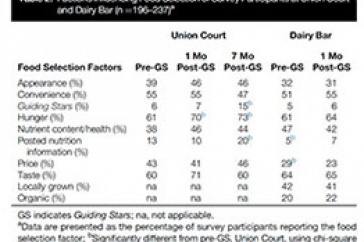The University of New Hampshire is a flagship research university that inspires innovation and transforms lives in our state, nation and world. More than 16,000 students from all 50 states and 71 countries engage with an award-winning faculty in top ranked programs in business, engineering, law, health and human services, liberal arts and the sciences across more than 200 programs of study. UNH’s research portfolio includes partnerships with NASA, NOAA, NSF and NIH, receiving more than $100 million in competitive external funding every year to further explore and define the frontiers of land, sea and space.
Guiding Stars Raises Awareness of Healthy Food Choices in UNH Dining Halls

This table shows what factors influenced food choices by survey respondents in the research study.
DURHAM, N.H. – New research found the Guiding Stars nutritional rating system, which educates consumers about healthy food options, had a positive effect raising awareness of healthy food choices available at the University of New Hampshire.
“Many of us are looking to make changes that will support health and well-being. Food selection – whether it be at a grocery store, vending machine, dining hall or restaurant – can be overwhelming to people,” said Jesse Stabile Morrell, principal lecturer of nutrition at UNH. “This work suggests that a simplified rating system like Guiding Stars influences peoples’ perceptions of the availability of healthy foods and the factors that dictate their choice. Eating establishments may find this helpful when they design menus or display information to customers – who are increasingly looking for food options that support their health goals.”
The research was conducted by Gale Carey, professor emeritus of nutrition; Rochelle L’Italien, dietitian with UNH Dining Services; and Morrell. The research results are presented in the Journal of Nutrition Education and Behavior in Guiding Stars Influences Perception of Healthy Food Choices at a 4-Year University.
The researchers found that after implementation of Guiding Stars at the centrally located Union Court, respondents more often reported that posted nutrition-information and specifically Guiding Stars had influenced their food selections. The percentage of respondents who thought healthy foods were always or mostly available increased from 34 percent to 53 percent seven months after adding the rating system.
UNH was one of the first schools in the nation to partner with the Guiding Stars to supplement nutritional labeling to encourage healthier eating by students. The Guiding Stars rating system, which was introduced into the dining halls at UNH in the 2009-2010 academic year, identifies key information such as calories, grams of fat and grams of carbohydrates, and provides one of the most complete, simple to use nutritional guidance programs available today.
“We aim to broaden our understanding of the environmental and behavioral factors that influence healthy behaviors, particularly those that influence unhealthy weight gain,” Morrell said. “Poor diets and weight gain adversely affects health and targeted research is needed to increase understanding of the interaction between individual and environmental factors associated with this adverse outcome.”
New Hampshire has the 14th lowest adult obesity rate in the nation, according to The State of Obesity: Better Policies for a Healthier America released last September. New Hampshire's adult obesity rate is currently 26.3 percent, up from 16.1 percent in 2000 and 9.9 percent in 1990.
This material is based upon work supported by the NH Agricultural Experiment Station, through joint funding of the National Institute of Food and Agriculture, U.S. Department of Agriculture, under award number 0231219, and the state of New Hampshire. This research also was supported by UNH Dining Services.
Founded in 1887, the NH Agricultural Experiment Station at the UNH College of Life Sciences and Agriculture is UNH’s original research center and an elemental component of New Hampshire's land-grant university heritage and mission.
IMAGES AVAILABLE FOR DOWNLOAD
https://colsa.unh.edu/nhaes/sites/colsa.unh.edu.nhaes/files/media/images/dairybar.jpg
https://colsa.unh.edu/nhaes/sites/colsa.unh.edu.nhaes/files/media/images/dairybar2.jpg
Guiding Stars has been implemented at the Dairy Bar at the University of New Hampshire.
https://colsa.unh.edu/nhaes/sites/colsa.unh.edu.nhaes/files/media/images/table2.jpg
This table shows what factors influenced food choices by survey respondents in the research study.
-
Media Contact
Lori Tyler Gula, PhD | NH Agricultural Experiment Station | lori.gula@unh.edu | 603-862-1452
Latest News
-
November 6, 2025
-
November 5, 2025
-
October 24, 2025
-
October 8, 2025
-
October 2, 2025
















































